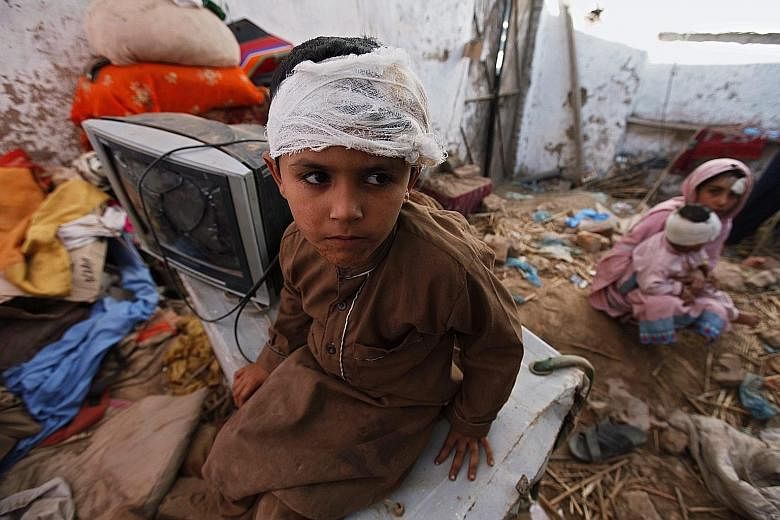KABUL • The mourning family had to buy the burial shroud, 20m of white linen, on credit from their district bazaar in northern Afghanistan. But at least the two crushed bodies of their teenage sons, pulled from the wreckage of a devastating earthquake after three hours of digging, could be put to rest on Tuesday.
But for the family, living in a Taleban-controlled area near the centre of Monday's powerful earthquake, the ordeal was not over: Dozens of militants lingered around the house after the burial ceremony, demanding to be fed.
The extent of the family's wealth had come down to several apricot and mulberry trees, a half-dozen sheep and a cow. To feed the insurgents, the family had to slaughter one of its last goats.
"Every night, every day, we have 20 or 30 Taleban coming asking for food," one of the relatives said, speaking on condition of anonymity out of fear of reprisal. "And we can't even afford one loaf of bread for our own children."
For many in Afghanistan's eastern and north-eastern provinces, the earthquake, which killed more than 300 people across northern Afghanistan and Pakistan and destroyed about 7,000 homes in Afghanistan alone, added a new layer to their misery.
For months, residents had already been caught in a gruelling conflict as the Taleban waged offensives against government forces and militias in the north-east, and as the militants claiming loyalty to the Islamic State in Iraq and Syria (ISIS) gained a foothold in parts of the east.
Now, the rumbling earth has left many families homeless just as winter is about to set in.
The contested status of many of the 103 Afghan districts affected has raised a major challenge for the government and aid workers: How should they navigate the often-intense fighting to reach those families?
While non-governmental organisations (NGOs) regularly use tribal elders and local syura councils to mediate and to open space for relief work, the intensity of the new fighting across the north has left aid workers nervous.
"In areas where access is easy, the government works in partnership with local aid organisations," said Mr Wais Ahmad Barmak, Afghanistan's state minister for disaster management. "But in areas where we can't go because of our government label, the solution we found is to rely on local NGOs who already operate there anyway."
The Taleban said in a statement it had ordered its fighters "in the affected areas to lend their complete help to the victims and facilitate those giving charity to the needy".
Mr Maulavi Amanuddin, the Taleban shadow governor in north-eastern Badakhshan province, the epicentre of the quake, was almost pleading for aid agencies to come to Warduj, the district they control.
The economic situation was dire, he said, and the government should not use the presence of their forces as a pretext to block the assistance. Aid workers, "be they bearded, or not, wearing red or green or any colour", would be protected, Mr Amanuddin said.
Officials in Pakistan and Afghanistan said that the combined death toll had risen to 370 with many thousands left homeless.
The officials warned that a complete picture of the damage, including remote areas isolated by difficult terrain and an active insurgency, could take days to emerge.
In the east of the country, representatives of the Red Crescent Society said they felt comfortable carrying on with relief work, but they, too, were weary of "the new groups", a reference to the ISIS affiliates.
NEW YORK TIMES

